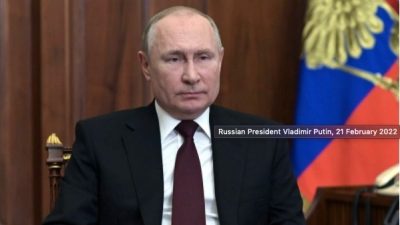Why John Mearsheimer Blames the U.S. for the Crisis in Ukraine
For years, the political scientist has claimed that Putin’s aggression toward Ukraine is caused by Western intervention. Have recent events changed his mind?

All Global Research articles can be read in 51 languages by activating the “Translate Website” drop down menu on the top banner of our home page (Desktop version).
To receive Global Research’s Daily Newsletter (selected articles), click here.
Visit and follow us on Instagram at @globalresearch_crg and Twitter at @crglobalization. Feel free to repost and share widely Global Research articles.
Today, the dangers of military escalation are beyond description.
What is now happening in Ukraine has serious geopolitical implications. It could lead us into a World War III Scenario.
It is important that a peace process be initiated with a view to preventing escalation.
Global Research does not support Russia’s invasion of Ukraine.
The history of this war must be understood.
The bombing and shelling led by Ukraine’s Armed Forces directed against the people of Donbass started eight years ago, resulting in the destruction of residential areas and more than 10,000 civilian casualties.
A bilateral Peace Agreement is required.
The political scientist John Mearsheimer has been one of the most famous critics of American foreign policy since the end of the Cold War. Perhaps best known for the book he wrote with Stephen Walt, “The Israel Lobby and U.S. Foreign Policy,” Mearsheimer is a proponent of great-power politics—a school of realist international relations that assumes that, in a self-interested attempt to preserve national security, states will preëmptively act in anticipation of adversaries. For years, Mearsheimer has argued that the U.S., in pushing to expand NATO eastward and establishing friendly relations with Ukraine, has increased the likelihood of war between nuclear-armed powers and laid the groundwork for Vladimir Putin’s aggressive position toward Ukraine. Indeed, in 2014, after Russia annexed Crimea, Mearsheimer wrote that “the United States and its European allies share most of the responsibility for this crisis.”
The current invasion of Ukraine has renewed several long-standing debates about the relationship between the U.S. and Russia. Although many critics of Putin have argued that he would pursue an aggressive foreign policy in former Soviet Republics regardless of Western involvement, Mearsheimer maintains his position that the U.S. is at fault for provoking him. I recently spoke with Mearsheimer by phone. During our conversation, which has been edited for length and clarity, we discussed whether the current war could have been prevented, whether it makes sense to think of Russia as an imperial power, and Putin’s ultimate plans for Ukraine.
Click here to read the full article.
*
Note to readers: Please click the share buttons above or below. Follow us on Instagram, @globalresearch_crg and Twitter at @crglobalization. Feel free to repost and share widely Global Research articles.
Featured image is from Sputnik News/Alexey Nikolsky

